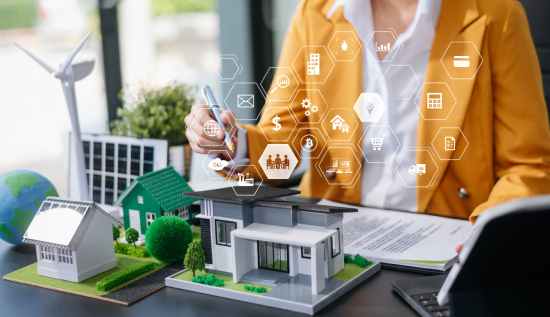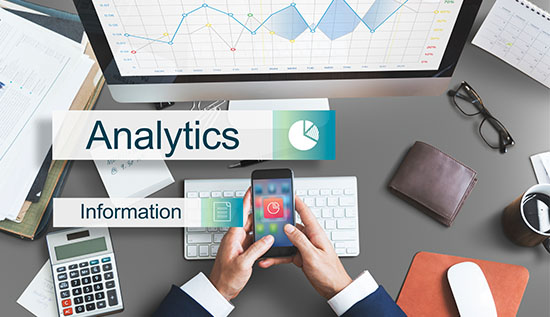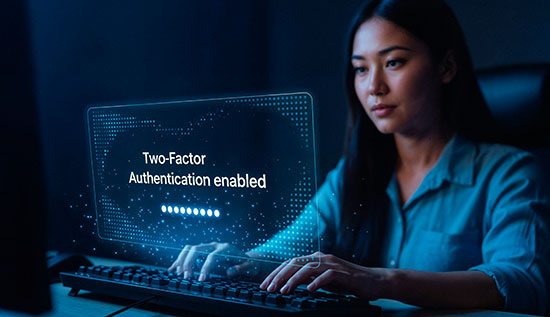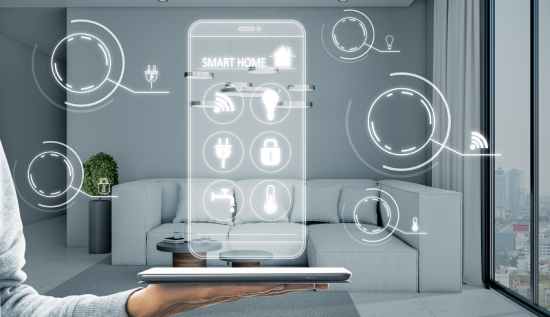Real Estate Technology Trends: PropTech & Smart Solutions

From AI to IoT, the latest real estate technology trends are transforming how developers, investors, and property managers operate in a connected era.
One of the most significant transformations of the contemporary era has occurred in the real estate industry. The property sector has transitioned from paper-intensive processes to data-driven ecosystems as a result of the accelerated advancements in digital technology, automation, and artificial intelligence. The design, construction, sale and management of properties, are being transformed by the proliferation of real estate technology trends which are commonly referred to as PropTech. Developers, investors and property managers must adjust in order to remain competitive in the new era of digital transformation in real estate as proptech solutions and smart building technology continue to revolutionize the landscape.
This article investigates the primary emerging technology trends in real estate and property management, the manner in which PropTech is altering the property sector, and the technology adoption strategies for property developers can employ to optimize efficiency, sustainability, and profitability.
The Evolution of Real Estate Technology
Over the course of several decades, the real estate sector relied on conventional methods which included face-to-face interactions, written documentation and manual data administration. As a result of the proliferation of real estate IT solutions and advanced property managements software, the industry has entered a new phase in which digital systems expedite processes, minimize the likelihood of errors caused by humans and enhance the quality of experiences provided to customers.
Proptech solutions that were developed in the early stages generally concentrated on listing systems, online marketplaces, and customer relationship management products. Today, the area has undergone a significant expansion, which includes the incorporation of artificial intelligence-driven valuations, blockchain technology for transactions, smart sensors and even virtual reality property tours. The incorporation of smart building technology makes it possible to control energy in real time and do predictive maintenance. At the same time, the digital transformation in real estate industry, is compelling businesses to become more data-centric and nimble.
Understanding PropTech: The Backbone of Modern Real Estate
Innovative digital tools and platforms, that are intended to improve all aspects of the real estate lifecycle, are referred to as PropTech, or "Property Technology." This encompasses asset management, tenant experience, leasing, sales and construction. Proptech solutions serve as a conduit between conventional property management, and the emerging digital economy.
The following are some of the most significant real estate technology trends in PropTech:
- AI and Machine Learning: Utilized for the purposes of automated property valuation, predictive maintenance and market forecasting.
- Blockchain Technology: Guarantees the security, and transparency of property transactions and smart contracts.
- Internet of Things (IoT): Facilitates the implementation of smart building technology which involves the monitoring of energy consumption, air quality and occupancy by sensors.
- Augmented and virtual reality: Offers immersive property excursions to investors and buyers.
- Big Data Analytics: Provides a comprehensive understanding of market demand, investment potential and tenant behavior.
The technology in property sector is no longer merely a trend; it is now a business necessity. Companies that neglect to incorporate digital systems are at risk of losing their market position amid rising competition, and customer expectations.
Smart Building Technology: Creating Intelligent Spaces
The progress in smart building technology, is one of the emerging technology trends in real estate and property management. These new ideas use automation systems, AI-driven analytics and connected devices to make places safer, more efficient and quicker to respond.
Key Features of Smart Buildings:
- Energy Efficiency: Smart HVAC, and lighting systems change based on how many people are in the room and how much natural light is coming in.
- Predictive Maintenance: IoT monitors find problems before they get too big and cost a lot to fix.
- Tenant Comfort: Customized settings for lighting, and, climate make the experience better for the user.
- Sustainability: Eco-friendly practices, are facilitated by smart water and waste management systems.
Property managers can improve tenant satisfaction, and reduce operational costs by incorporating smarts building technology. This is a fundamental aspect of contemporary real estate technology trends, as it not only enhances profitability but also promotes long-term sustainability objectives.
The Role of Property Management Software
These days, the real estate market depends on automation, and speed. Property managements software, is very important for making administrative chores like collecting rent and planning maintenance easier. One of the most popular IT options in the real estate IT solutions is these platforms.
Benefits of Using Property Management Software:
- Centralized Data Management: Property managers can supervise numerous properties, from a solitary dashboard.
- Automated Workflows: Human error, is minimized, by automating routine processes, such as billing, and, reporting.
- Improved Communication: Both tenant portals, and built-in chat systems, contribute to increased openness.
- Financial Insights: The use of advanced analytics enables owners to monitor spending and make revenue projections.
- Regulatory Compliance: Automated record-keeping simplifies audits and, legal compliance.
There are further benefits of using property managements software in addition, to the ease it provides; it is also a strategic move toward scalability, and cost reduction. Software-driven management solutions, are on their way to becoming the norm rather than the exception in the real estate industry as technology in property sector with each passing year.
Explore more: Current Technology Trends in Cambodia and Predictions for 2025
Digital Transformation in Real Estate: Redefining the Industry
The integration of digital tools into every aspect of the property lifecycle, is referred to as, digital transformation in real estate. This transformation facilitates real-time decision-making more intelligent resource allocation, and enhanced consumer engagement.
For example, real estate IT solutions, that are cloud-based enable teams to access property data from any location, thereby guaranteeing operational continuity. In the interim, proptech solutions employ automation to simplify transactions, eradicate redundancies, and, reduce paperwork.
The Impact of Digital Transformation:
- Data-Driven Insights: Businesses, can make informed investment decisions, by analyzing trends.
- Enhanced Efficiency: The processing times and manual labor are reduced by automated systems.
- Improved User Experience: Tenants and purchasers experience more transparent, and seamless interactions.
Enhanced Security: Transactions and sensitive data are safeguarded by blockchain and encryption technologies.
Organizations can succeed in today's tech-driven market through digital transformation in real estate industry which promotes a culture of innovation.
Emerging Technology Trends in Real Estate and Property Management
A number of emerging technology trend in real estate and property management, are transforming the industry at an unprecedented rate. In addition to enhancing efficiency, these technologies also redefine the function of human professionals within the industry.
a. Artificial Intelligence (AI) and Predictive Analytics
AI systems analyze enormous quantities of data to forecast property prices, identify fraud, and suggest investment strategies. AI is employed by property administrators to optimize rent pricing, and anticipate maintenance requirements.
b. Augmented and Virtual Reality
Virtual reality visits are now prevalent in the sale of both residential, and commercial properties. AR applications improve consumer engagement by allowing clients to visualize renovations or furnishings prior to making purchase decisions.
c. Blockchain Technology
Blockchain guarantees transaction transparency, and eliminates intermediaries. Instantaneous property transfers are enabled by smart contracts which enhances trust, and simplifies legal issues.
d. The Internet of Things (IoT)
Smarts building technology is enabled by IoT devices which collect real-time data on temperature, humidity, and occupancy through sensors. This enables the operation of buildings in an energy-efficient manner.
e. Robotics and 3D printing
3D printing is being utilized by developers to facilitate rapid, cost-effective construction. Precision, safety, and efficiency, are all improved by robotics on construction sites.
These real estate technology trends are not merely futuristic concepts; they are practical instruments, that are currently enhancing the efficiency, sustainability, and profitability of the property sector.
How PropTech is Changing the Property Sector
Recognizing how PropTech is changing the property sector, on all industry stakeholders from investors, and tenants to developers, and agents, is essential for comprehending, the way in which it is transforming the property sector.
For Developers:
Developers are equipped with project management tools, digital duplicates, and, AI-driven feasibility studies as a result of proptech solution. Property developers, are currently emphasizing automation, sustainability, and data-driven insights, in their Technology adoption strategies for property developers.
For Investors:
Advanced analytics platforms give you real-time information about the market which helps you make better financial choices. Platforms, that are backed by blockchain also make things more clear and lower risk.
For Property Managers:
In order to guarantee greater occupant satisfaction, and retention, property managements software enhances maintenance workflows, automates billing, and, improves tenant engagement.
For Tenants:
Tenants, can enhance their living experience by regulating lighting, climate, and, security systems through smart applications. The trust between tenants, and landlords is also enhanced by transparent communication channels.
How PropTech is changing the property sector by enhancing its efficiency, innovation, and, consumer focus. This is illustrated, by the synergy of these developments.
Technology Adoption Strategies for Property Developers
It is necessary to have a well-defined plan in order to successfully technology in property sector. When it comes to Technology adoption strategy for property developers, need to ensure, that they link innovation with business goals while also tackling difficulties related to culture and operations.
Among the most important strategies are:
1. Start with a Digital Vision
When it comes to digital development, developers, should identify their long-term goals, whether they are focused on efficiency, sustainability, or the customer experience.
2. Invest in Scalable Real Estate IT Solutions
Adopt platforms, that are capable of expanding along with the firm, incorporating over time additional technologies, such as property managements software or artificial intelligence analytics.
3. Train Staff and Build a Tech-Ready Culture
Employee resistance, is one of the most significant obstacles to the use of digital technology. Regular training helps to ensure, that transitions go smoothly.
4. Collaborate with PropTech Startups
The acceleration of transformation, and the provision of access to cutting-edge proptech solutions are both delivered through partnerships with innovative companies.
5. Leverage Data and Analytics
When making decisions regarding maintenance, energy efficiency, the tenant experience, use the data, that is generated by smarts building technology.
Businesses can stay competitive and meet the changing needs of digital-age customers by helping technology adoption strategy for property developers.
The Benefits of Using Property Management Software
The benefit of using property management software extend beyond automation. These systems establish a seamless ecosystem that enables efficient interaction among all stakeholders, including landlords, tenants, contractors and accountants.
Top Benefits Include:
- Automates repetitive duties such as lease renewals, and invoicing, to save time.
- Error Reduction: Manual data entry errors, are reduced by digital systems.
- Improved Decision-Making: Financial performance insights, are provided by advanced analytics.
- Improved Tenant Relations: Tenants value transparent service, and prompt communication.
- Smarts Building Technology Integration: Facilitates automated management of HVAC, lighting, and access systems.
The adoption of property managements software is a critical component of the broader real estate technology trends, as it guarantees long-term operational excellence and a competitive advantage.
Challenges in Adopting Real Estate Technology
The adoption of real estate IT solution is not without its challenges, despite the advantages. Many organizations encounter resistance to change, integration difficulties, and high initial costs.
Common Obstacles:
- Legacy Systems: Modern software may not be supported, by older infrastructure.
- Data Security Issues: The hazards of cybersecurity are, elevated as a result of the increased digitization.
- Training Requirements: Teams require time, to adjust to new instruments.
- Regulatory Obstacles: The laws governing digital property transactions, are inconsistent across different jurisdictions.
Getting past these problems needs a planned strategy that includes new ideas, managing risks and involving stakeholders.
The Future of PropTech and Smart Real Estate
Emerging technology trend in real estate and property management of the future point to a future ruled by automation, sustainability, and hyper-personalization. PropTech solution will continue to change, making it harder to tell the difference between real estate and digital real estate.
What to Expect:
- AI-powered marketplaces are smart websites that match buyers and sellers perfectly.
- Green tech integration means that smart grids and green energy systems are built into the design of a building.
- Decentralized Transactions: Blockchain makes it possible for buying and selling to be fully automatic.
- Real estate in the metaverse: digital assets and owning land virtually are changing established markets.
As the digital transformations in real estate continues, the companies that can quickly change, and embrace new technologies while still focusing on people will be the ones who succeed.
Conclusion
The constant flow of real estate technology trends is changing the way people buy and sell homes around the world. Proptech solution, smarts building technology, property managements software, and real estate IT solutions are all moving the industry toward a future that is smart, connected, and efficient.
To stay competitive, property companies need to understand how PropTechs is changing the property sector and come up with strong technology adoption strategy for property developers. Using property managements software and embracing the digital transformations in real estate have benefit of using property management software. These benefits change how we live, work, and interact with our built environment.
It's no longer just about place in the real estate market; it's also about new ideas. People who put money into the future of technology in the property sector will be in charge of the next generation of great real estate agents.
Read More: The Rise of Technology in Cambodia: A New Era of Innovation
More Articles
 05 Mar 2026
05 Mar 2026
Self-Service Analytics & BI: No-Code Tools for Non-Technical
Self-service analytics empowers non-technical users with intuitive dashboards, drag-and-drop BI and smarter decisions.
 04 Mar 2026
04 Mar 2026
Federated Learning: Privacy-Preserving & Secure AI
Build secure AI models using federated learning and collaborative ML without centralizing sensitive data.
 04 Mar 2026
04 Mar 2026
TinyML in Smart Home Devices: AI, IoT & Edge Automation
TinyML in smart home devices is transforming AI-powered smart home devices with faster processing, improved privacy, and energy-efficient AI for IoT at the edge.
 03 Mar 2026
03 Mar 2026
Human Augmentation Technology: Future Breakthroughs 2026
Discover the future of human augmentation technology in 2026—exploring advanced human augmentation devices, tools, innovations, and breakthroughs shaping the future of human enhancement and technology.